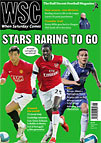 You Are The Ref challenge is back and testing would-be refs, writes Ian Plenderleith
You Are The Ref challenge is back and testing would-be refs, writes Ian Plenderleith
In the future, everyone will be a referee for 15 minutes. Ruud van Nistelrooy’s goal for Holland against Italy at Euro 2008 not only prompted a fervent discussion about the offside laws, it also exposed the fact that players, ex-players, pundits and fans alike for once had something in common – very few of us are truly familiar with the laws of the game. By a nice coincidence, the BBC website chose Euro 2008 to revive the You Are The Ref column that puts exactly such unusual scenarios to its reader, and then lets them get on with exposing their own ignorance.
There’s actually no excuse for not knowing the game’s laws. They’re available for download from fifa.com in a pdf file, and they’re not that long. Still, they leave plenty of room for interpretation, and with major games nowadays under the scrutiny of a dozen or more cameras, there always seem to be an arcane point up for debate, even if some of those are the result of commentators eager to stoke up a quasi-controversial incident.
The People newspaper began You Are The Ref in 1957, then for years Shoot! magazine continued the illustrated column, drawn throughout its half century of life by Paul Trevillion. If I remember correctly, some of its conundrums were easy, and were aimed at familiarising the young reader with the game’s laws. Some were just odd, which gave the column a trainspotterish charm. If a mongoose runs on to the field of play and diverts a shot into the net, do you award a goal? That kind of thing.
The BBC incarnation has so far proved that interpreting football’s laws retains infinite possibilities. If a player holds on to the post for balance while clearing a ball off the line, is he seeking to gain an unfair advantage? You’d think that the answer would be a straight “No”, until you consider that swinging from the crossbar and clearing the ball away is a yellow-card offence. The Beeb (or rather its expert, one Mr Keith Hackett) sensibly waits for a couple of days before posting the answer so that you, the imaginary match officials of the vast beyond, can offer your own thoughts on the matter. After two days, 141 cyber-refs had done just that.
The great thing about this column is that even after Mr Hackett has given his opinion, the debate continues in the comments. You suspect that several referees read the site. “I have this terrible feeling that the man in charge of our referees doesn’t actually know the Laws…” writes one respondent. But in truth most of the pre-supposed scenarios are unusual enough that referees might have to think on their feet and instinctively react in a commonsense manner. As opposed to recalling the exact letter of the law and applying it to, say, the following query: a goalkeeper and a defender waste time by playing header-and-catch to each other on the edge of the penalty area. Legal it might be, but few refs are going to stand there and let them continue without making a gesture of admonitory impatience to move the ball upfield.
What I like about You Are The Ref is the fertile footballing imagination of those who send in their “What if…?” queries. If you go to the official site of the US Soccer Federation, they have an Ask The Ref section that is taken very seriously by both those asking questions and those giving answers. Most of the queries are based on real situations and require so much concentration to follow the acronym-filled paragraphs of build-up to the situation in question that you’ll be put off for good from training for your official’s badge.
In fact it’s quite terrifying to picture yourself in some of these situations, with 22 expectant players, their coaching staff and any number of spectators (including possibly rabid parents) waiting for you to make the snap decision, which must appear to be the correct one. Often, several or all of these people will be offering their own advice and interpretations of what’s just happened, and anyone who’s taken the whistle for a seemingly casual game will be familiar with the sudden noise and pressure.
Until we read the ref’s advice underneath the query, though, most of us generally can’t be sure of the answer. We may immediately recognise the advice as correct, but would we have made the right decision in half a second? In that respect, these are entertaining and useful pages that players and fans should read. The internet, after all, is as much about education as it is about leisure, and given the overall deficit of knowledge on even some of the game’s basic laws, should serve as homework for all of us who instinctively love to scream at that poor bastard in the middle.
From WSC 259 September 2008